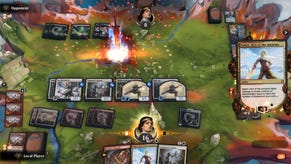Magic: the Gathering’s latest standard bans puts time shenanigans in time out
One turn per turn, Wizards says.
The latest rounds of Magic: the Gathering cards banned in organised play has been handed down by publisher Wizards of the Coast, and it specifically targets decks that can churn out multiple turns in a row using a card called Alrund’s Epiphany.
Wizards announced the updates to the ban list on January 25th, adding three cards to the standard format’s ledger, and one each to Legacy and Historic. Interestingly, one previously banned planeswalker was rebalanced in the latest chunk of Alchemy changes and released from cardboard prison.
Starting in standard, the most prominent name is Alrund’s Epiphany, a Blue mana sorcery card introduced in 2021’s Kaldheim set. Players can cast it for seven mana - six if it’s foretold - to create a couple of bird tokens and take an extra turn after their current one finishes. This is powerful on its own, but Izzet decks (a duo of Blue and Red mana) have paired the chunky spell with cards that copy the next spell cast.
There’s plenty of these floating around Standard at the moment, such as Galvanic Iteration, and has led to a meta where players will stall matches until they can cast Alrund’s Epiphany two or even three times. Opponents have no choice but to sit and watch as the time criminal effectively plays by themselves, casting a glut of burn spells, big creatures and otherwise creating an unwinnable situation. Wizards has been eyeing Alrund for a while and finally decided it was time to take him down a peg.
Other Blue mana control decks also lost a key piece of their metagame dominance in the form of Divide by Zero, an instant spell that shunts permanents (creature, artifacts, enchantments, etc.) back to the hand while also letting the caster Learn, a keyword from Strixhaven that gives access to a special sideboard of Lesson cards. It’s general usefulness made it a must-include, and Wizards believe it answered too many threats on its own, thereby earning a bonk from the banhammer.
The last standard card banned in this pass is Faceless Haven, a Snow Land that can become a creature with vigilance in a pinch. It’s a staple of mono-colour aggro decks that plonk down threats and go for the throat as soon as possible. Wizards said in the announcement that these decks are currently dominating the Arena ladder. Kicking the key land onto the sidelines is a more efficient way of balancing the environment than targeting multiple creatures who may not be so threatening on their own.

Wizards of the Coast put blue spell Brainstorm in a suspended state in hopes that Blue mana decks wouldn’t remain so strong, but that hasn’t played out - Brainstorm has officially been banned. In what’s sure to be a contentious choice, Teferi, Time Raveler has been fed through the Alchemy rebalancing machine and come out the other side in a state the publisher feels is safe to play in the Historic format.This version of the time-bending planeswalker was released in the War of the Spark set, and he now costs a little more and has been geared towards an anti-control state versus his previous broadly useful pool of abilities.
Players may not accept his return, though. The announcement of Alchemy - an Arena-only mode where cards could both be rebalanced and fitted with digital-only mechanics - was met with frustration and outrage from the playerbase over the decision to replace Historic cards with their retuned alternatives. The community assumed Historic would remain a hands-off home of old cards, similar to Legacy in paper, and they viewed Alchemy as a breach of that covenant. Speaking of Legacy, errant monkey pirate Ragavan, the Pilferer was the last ban announced, hoping to curtail decks using him from snowballing within the first couple of turns.
Depending on who’s asked, bans are a touchy subject in the Magic: the Gathering community. Some call them healthy limiters on a game that changes every four months, while others see the need for bans as symptomatic of a broken design process. 2021 may have seen fewer bans than the spree from previous years, but beginning the new year with three cards being ousted from Standard isn’t the best foot forward.









